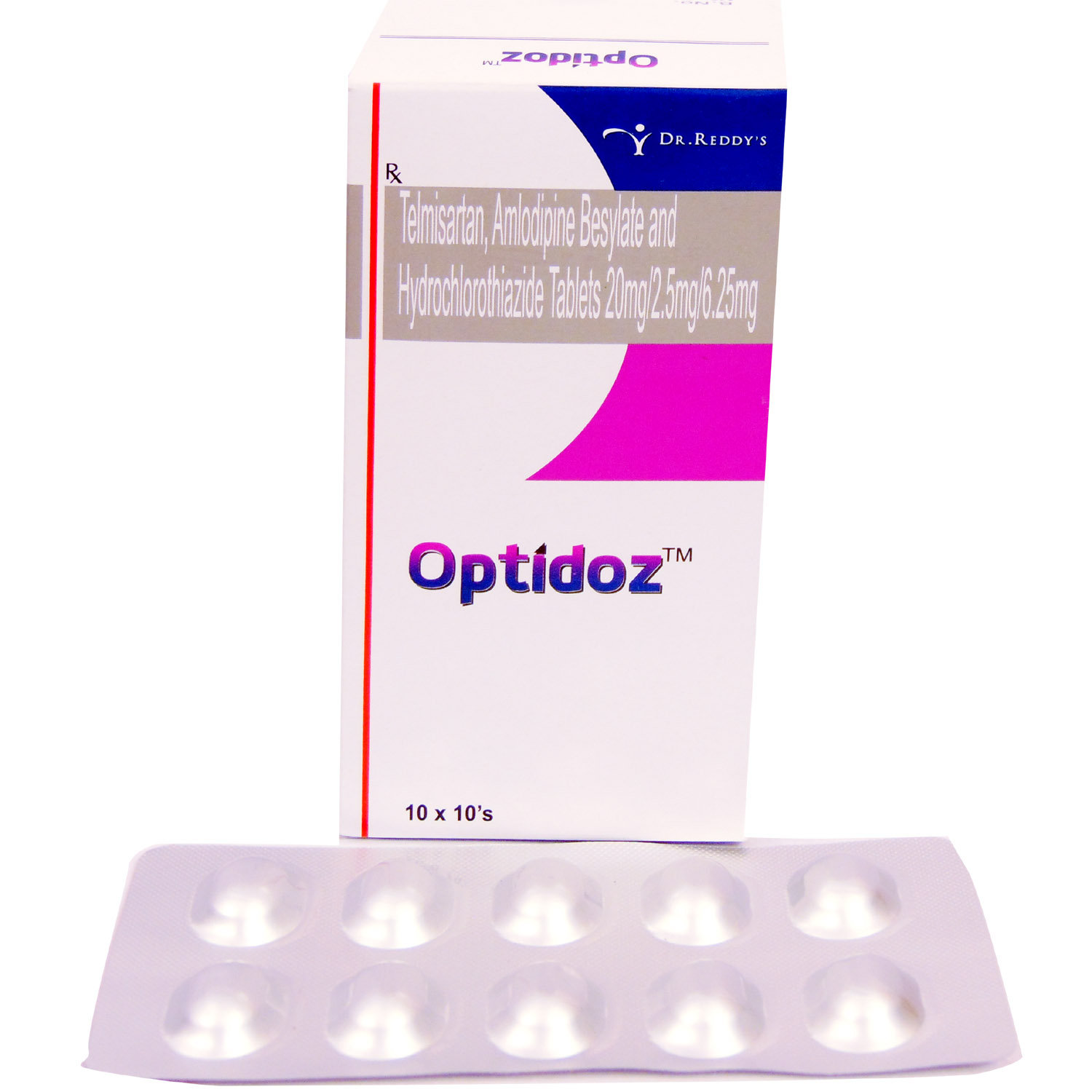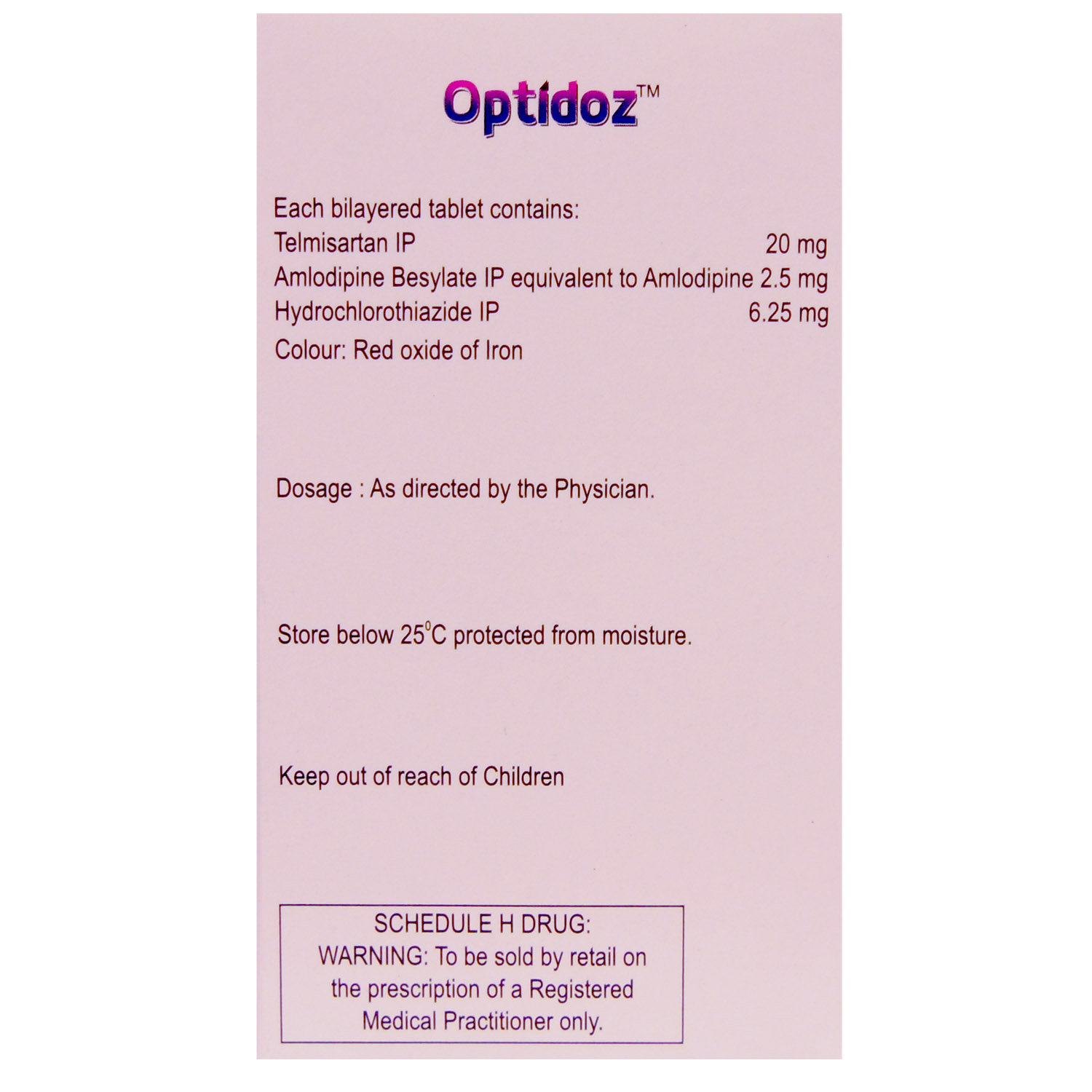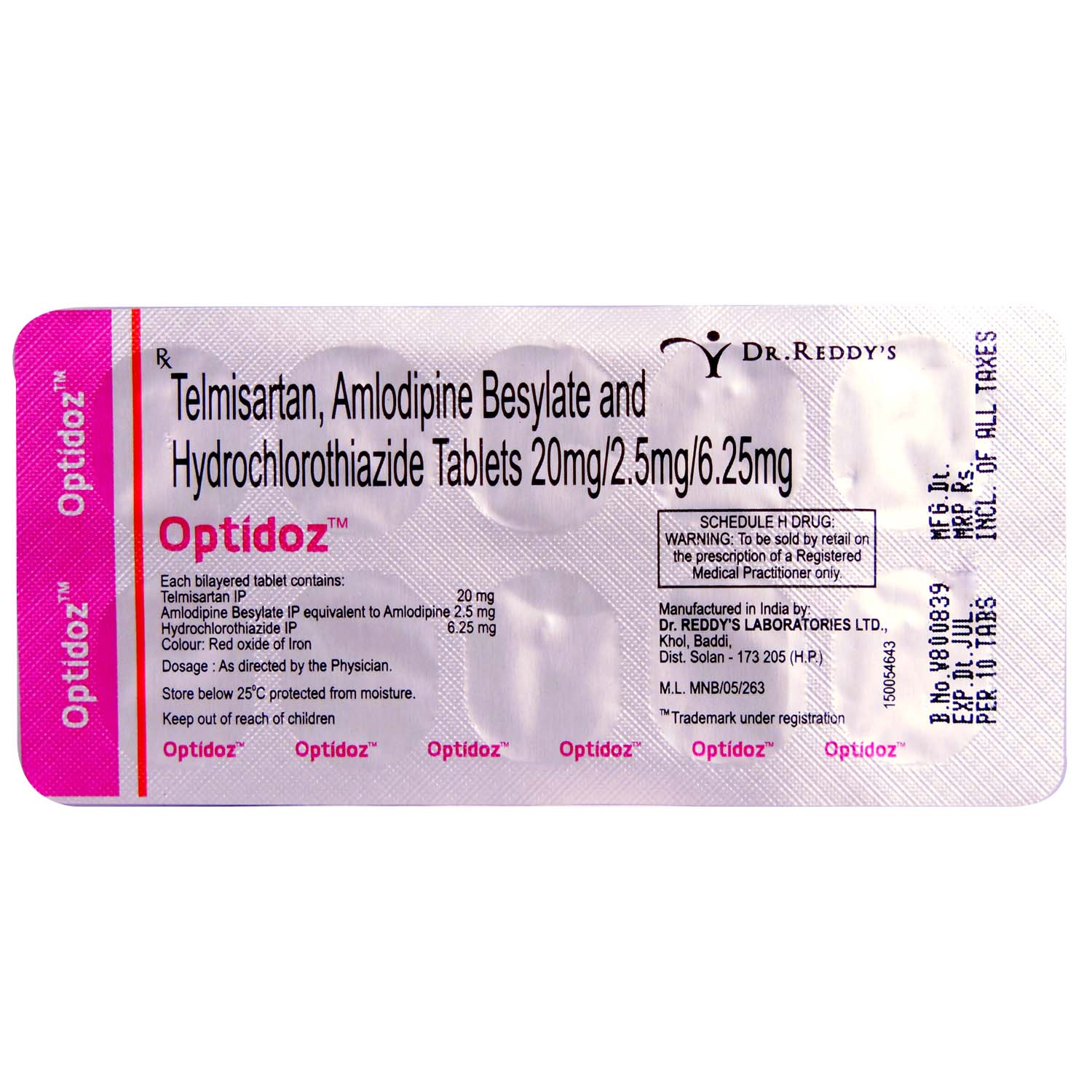Optidoz Tablet 10's
MRP ₹207
(Inclusive of all Taxes)
₹31.1 Cashback (15%)
Provide Delivery Location
Online payment accepted
 Prescription drug
Prescription drugWhats That
Manufacturer/Marketer :
Consume Type :
Expires on or after :
Return Policy :
About Optidoz Tablet
Optidoz Tablet belongs to the class of anti-hypertensives and is primarily taken for the treatment of hypertension (high blood pressure). Hypertension or high blood pressure is a chronic condition in which the force exerted by the blood against the artery wall is high. As a result, it leads to heart diseases, irregular heartbeat, and other complications. Oedema may occur in case of high blood pressure where fluids of the body get trapped in the tissues of the hands, arms, feet, ankles, and legs leading to its swelling.
Optidoz Tablet is a combination of Telmisartan, Amlodipine, and Hydrochlorothiazide which are antihypertensive medicines. Telmisartan is an angiotensin receptor blocker and works by blocking the action of certain substances that are responsible for tightening the blood vessels. It allows the blood to flow more smoothly and makes the heart more efficient at pumping blood throughout the body. Amlodipine is a calcium channel blocker and works by relaxing and widening the blood vessels. Hydrochlorothiazide is a diuretic and its function is to remove extra water and certain electrolytes from the body through urine. Optidoz Tablet helps to lower high blood pressure thus reducing the chances of future heart attack and stroke.
You can take Optidoz Tablet with food or without food. It should be swallowed whole with a glass of water. Do not chew, bite, or break it. Your doctor will guide you on how to take tablets based on your medical condition. In some cases, you may experience ankle swelling, headache, dizziness, tiredness, taste change, muscle weakness, dry mouth, and extreme thirst. Most of these side effects of Optidoz Tablet do not require medical attention and gradually resolve over time. However, if the side effects are persistent, reach out to your doctor.
Don't stop taking $ name without your doctor's advice. Sudden Stopping Optidoz Tablet may cause changes in your heart rhythm and blood pressure, cause chest pain, or a heart attack. Your doctor will lower your dose gradually over a period of time to help prevent these symptoms. It is advised to drink plenty of fluids while taking this medicine to overcome dry mouth and extreme thirst.
Uses of Optidoz Tablet
Directions for Use
Key Benefits
When you take Optidoz Tablet , it works by relaxing the blood vessels and making the heart more efficient at pumping blood throughout the body. It helps to lower high blood pressure thus reducing the chances of future heart attack and stroke. It removes the extra water and certain electrolytes from the body through urine.
Storage
- Drink water or other clear fluids.
- To prevent worsening of pain, limit intake of tea, coffee, or alcohol.
- Include bland foods like rice, toast, crackers, and rice in your diet.
- Avoid lying down immediately after eating as it may cause indigestion or heartburn.
- Avoid acidic and spicy food as it may cause indigestion.
- Avoid driving or operating machinery or activities that require high focus until you know how the medication affects you.
- Maintain a fixed sleeping schedule, create a relaxing bedtime routine and ensure your sleeping space is comfortable to maximize your sleep quality.
- Limit alcohol and caffeine as these may worsen drowsiness and disturb sleep patterns.
- Drink plenty of water as it helps with alertness and keeps you hydrated and for overall well-being.
- Moderate physical activity can improve energy levels, but avoid intense workouts right before bedtime.
- Rest well; get enough sleep.
- Eat a balanced diet and drink enough water.
- Manage stress with yoga and meditation.
- Limit alcohol and caffeine.
- Physical activities like walking or jogging might help boost energy and make you feel less tired.
- Inform your doctor about dizziness symptoms. They may adjust your medication regimen or prescribe additional medications to manage symptoms.
- Follow your doctor's instructions for taking medication, and take it at the same time every day to minimize dizziness.
- When standing up, do so slowly and carefully to avoid sudden dizziness.
- Avoid making sudden movements, such as turning or bending quickly, which can exacerbate dizziness.
- Drink plenty of water throughout the day to stay hydrated and help alleviate dizziness symptoms.
- If you're feeling dizzy, sit or lie down and rest until the dizziness passes.
- Track when dizziness occurs and any factors that may trigger it, and share this information with your doctor to help manage symptoms.
- Inform your doctor about the nausea and discuss possible alternatives to the medication or adjustments to the dosage.
- Divide your daily food intake into smaller, more frequent meals to reduce nausea.
- Opt for bland, easily digestible foods like crackers, toast, plain rice, bananas, and applesauce.
- Avoid certain foods that can trigger nausea, such as fatty, greasy, spicy, and smelly foods.
- Drink plenty of fluids, such as water, clear broth, or electrolyte-rich beverages like coconut water or sports drinks.
- Use ginger (tea, ale, or candies) to help relieve nausea.
- Get adequate rest and also avoid strenuous activities that can worsen nausea.
- Talk to your doctor about taking anti-nausea medication if your nausea is severe.
- Record when your nausea occurs, what triggers it, and what provides relief to help you identify patterns and manage your symptoms more effectively.
Drug Warnings
Optidoz Tablet should be used with extreme caution in patients with liver, kidney, cardiovascular diseases and diabetic patients. Use only if the potential benefit justifies the potential risk. please consult your doctor, Your doctor will weigh the benefits and any potential risks before prescribing it to you. Please consult your doctor.
Drug-Drug Interactions
Drug-Drug Interactions
Login/Sign Up
Co-administration of Aliskiren with Optidoz Tablet can increase the risk of hyperkalemia (high potassium levels in the blood).
How to manage the interaction:
Taking Optidoz Tablet with Aliskiren can possibly lead to an interaction, please consult a doctor before taking it. Do not discontinue the medications without consulting a doctor.
Using Optidoz Tablet together with dantrolene may increase the risk of hyperkalemia (high blood potassium).
How to manage the interaction:
Taking Optidoz Tablet with Dantrolene can cause an interaction, consult a doctor before taking it. You should seek medical attention if you experience nausea, vomiting, weakness, confusion, tingling of the hands and feet, a weak pulse, or a slow or irregular heartbeat. Do not stop using any medications without talking to a doctor.
Taking Dofetilide and Optidoz Tablet can increase the risk of an irregular heart rhythm which can be severe. The risk increases in patients with a history of heart illness or electrolyte imbalance.
How to manage the interaction:
Combining Dofetilide and Optidoz Tablet together is not recommended as it can possibly result in an interaction, it can be taken if advised by your doctor. However, if you experience any symptoms like sudden dizziness, lightheadedness, fainting, shortness of breath, chest pain or tightness, rapid heartbeat, or memory loss, contact your doctor immediately. Do not discontinue any medications without consulting a doctor.
Taking Cisapride and Optidoz Tablet can increase the risk of an irregular heart rhythm which can be severe. The risk increases in patients with a history of heart illness or electrolyte imbalance.
How to manage the interaction:
Combining Cisapride and Optidoz Tablet together is generally avoided as it can possibly result in an interaction, it can be taken if advised by your doctor. However, if you experience any symptoms like dizziness, lightheadedness, fainting, or fast or pounding heartbeats, consult the doctor immediately. Do not stop using any medications without a doctor's advice.
Taking spironolactone with Optidoz Tablet may increase potassium levels in the blood.
How to manage the interaction:
Although there is a possible interaction, Optidoz Tablet can be taken with spironolactone if prescribed by the doctor. Consult the prescriber if you experience symptoms of high potassium such as nausea, vomiting, weakness, confusion, tingling of the hands and feet, feelings of heaviness in the legs, a weak pulse, or a slow or irregular heartbeat. Maintain adequate fluid intake during treatment with these medications. Do not discontinue the medications without consulting a doctor.
Co-administration of Optidoz Tablet increases levels of eluxadoline by increasing metabolism.
How to manage the interaction:
Taking Optidoz Tablet with Eluxadoline together can possibly result in an interaction, but it can be taken if your doctor has advised it. Do not discontinue any medications without consulting a doctor.
Taking Optidoz Tablet with benazepril may increase the risk of side effects such as low blood pressure, kidney function impairment, and high blood potassium.
How to manage the interaction:
Although there is a possible interaction, Optidoz Tablet can be taken with benazepril if prescribed by the doctor. Consult the prescriber if you experience symptoms of high potassium such as nausea, vomiting, weakness, confusion, tingling of the hands and feet, feelings of heaviness in the legs, a weak pulse, or a slow or irregular heartbeat. Maintain adequate fluid intake during treatment with these medications. Do not discontinue the medication without consulting a doctor.
Taking lisinopril with Optidoz Tablet may increase the levels of potassium in blood.
How to manage the interaction:
Although there is a possible interaction, Optidoz Tablet can be taken with lisinopril if prescribed by the doctor. Consult the prescriber if you experience symptoms of high potassium such as nausea, vomiting, weakness, confusion, tingling of the hands and feet, feelings of heaviness in the legs, a weak pulse, or a slow or irregular heartbeat. Maintain adequate fluid intake during treatment with these medications.
Taking Potassium Iodide with Optidoz Tablet can make high levels of potassium in the blood more likely.
How to manage the interaction:
Although taking Potassium iodide and Optidoz Tablet together can evidently cause an interaction, it can be taken if your doctor has suggested it. Do not stop using any medications without a doctor's advice.
Taking trimethoprim with Optidoz Tablet may increase potassium levels in the blood.
How to manage the interaction:
Although there is an interaction between Optidoz Tablet and trimethoprim, they can be taken together if prescribed by a doctor. However, consult a doctor if you experience nausea, vomiting, weakness, confusion, tingling of the hands and feet, feelings of heaviness in the legs, and a weak pulse. Do not discontinue the medications without consulting a doctor.
Drug-Food Interactions
Drug-Food Interactions
Login/Sign Up
Lentils, Orange Juice, Oranges, Raisins, Potatoes, Salmon Dried, Spinach, Sweet Potatoes, Tomatoes, Coconut Water, Beans, Beetroot, Broccoli, Bananas, Apricots, Avocado, Yogurt
How to manage the interaction:
Taking Optidoz Tablet with can cause high levels of potassium in your blood. Avoid taking potassium-containing salt substitutes or potassium supplements while being treated with Optidoz Tablet.
Diet & Lifestyle Advise
- Keep your weight under control with BMI 19.5-24.9.
- Do regular physical activity or exercise for at least 150 minutes per week, or about 30 minutes most days of the week. Doing this can help you to lower your raised blood pressure by about 5 mm of Hg.
- Avoid stress as it can raise your blood pressure. Try to enjoy and spent time with your loved ones to cope with stress and practice mindfulness techniques.
- Quitting smoking is the best strategy to lower the risk of heart disease.
- Option for a diet rich in whole grains, fruits, veggies, and low-fat dairy products.
- Limit intake of sodium chloride (table salt) in your daily diet to 2300 mg per day or less than 1500 mg is ideal for most adults.
- Try to include heart-healthy omega 3 fatty acids containing food drinks in your daily diet. You can also use low-fat cooking oil like olive oil, soybean oil, canola oil, and coconut oil can help in lowering your elevated blood pressure.
- Monitor your blood pressure daily and if there is too much fluctuation then immediately contact your doctor.
Side Effects of Optidoz Tablet
- Sleepiness
- Ankle swelling
- Headache
- Flushing
- Dizziness
- Tiredness
- Palpitations
- Stomach upset
Habit Forming
Therapeutic Class
All Substitutes & Brand Comparisons
Drug-Diseases Interactions
Drug-Diseases Interactions
Login/Sign Up
FAQs
No, you are advised to inform your doctor and monitor your blood pressure for at least two weeks before stopping the medicine. Depending upon your current blood pressure readings, there is a possibility your doctor may lower your medicine dosage and not recommend to discontinue it.
In case, If you forget to take Optidoz Tablet at any time, take it as soon as you remember, then continue to take it at the usual times. Do not take a double dose to make up for a forgotten dose.
Optidoz Tablet can be safely taken as long as your doctor has prescribed it to you. Conditions such as high blood pressure are life-long conditions and one should not abruptly discontinue it without discussing it with a doctor.
Yes, Optidoz Tablet can cause dizziness. It is advised to avoid driving or operate any heavy machinery while taking Optidoz Tablet . In case you feel dizzy or lightheaded, it is advised to rest for some time until you feel better.
Yes, Optidoz Tablet is contraindicated in people with known allergy to any of the components of this medicine. It should be avoided in people with severe kidney or liver impairment and in people with anuria (reduction or absence of urine). It should also be avoided in women who are in the second and third trimesters of their pregnancy.
Optidoz Tablet is a prescribed drug, given by a physician for preventing specific medical conditions. Taking it on your own can cause unwanted side effects.
Drug-Drug Interactions Checker List
- LITHIUM
- DIGOXIN
- METFORMIN
- SILDENAFIL
- SIMVASTATIN
- ENALAPRIL
- LISINOPRIL
- RAMIPRIL
- CYCLOSPORINE
- ALISKIREN
Special Advise
It is advised to restrict salt intake in the diet. Regularly monitor your blood pressure.
Disease/Condition Glossary
Hypertension: It is a chronic condition when blood pressure is too high. This condition can lead to hardened arteries (blood vessels), decreasing the blood and oxygen flow to the heart. Blood pressure is the measurement of the force that our heart uses to pump blood to all parts of the body. Raised blood pressure can cause chest pain (angina) and heart attack (when blood supply to the heart is blocked). Additionally, high blood pressure also causes brain damage (stroke) and kidney failure. High blood pressure can be diagnosed with the help of a blood pressure monitor or sphygmomanometer. Systolic pressure is the pressure when the heart pumps blood out. On the other hand, diastolic pressure is the pressure when your heart is at the resting stage between heartbeats. If your blood pressure is 140/90 mm of Hg, it means the systolic pressure is 140 mm of Hg and, diastolic pressure is 90 mm of Hg. Ideal blood pressure should be between 90/60 mm of Hg and 120/80 mm of Hg.

Have a query?
Alcohol
Safe if prescribed
You are recommended not to consume alcohol along with Optidoz Tablet to avoid unpleasant side-effects.
Pregnancy
Consult your doctor
Optidoz Tablet is not recommended during pregnancy unless your doctor considers it essential. Your doctor will weigh the benefits and any potential risks before prescribing it to you.
Breast Feeding
Consult your doctor
Optidoz Tablet is not recommended during breast-feeding. However, your doctor may prescribe it for you during breast-feeding if he/she feels that the benefit to you outweighs the risk. You should not take Optidoz Tablet without doctor's advice.
Driving
Safe if prescribed
It is advised to drive with caution after taking Optidoz Tablet as it usually causes drowsiness and affects the driving ability.
Liver
Consult your doctor
Optidoz Tablet is advised to be taken with caution, especially if you have or have had a history of liver disease. Your doctor will have to change the dosage depending on your medical condition and your reaction to treatment.
Kidney
Consult your doctor
It is not recommended in patients with chronic kidney disease (severe renal impairment). The safety and effectiveness in patients with severe renal impairment have not been established.
Children
Safe if prescribed
Not enough scientific data available for Optidoz Tablet , hence it is best to consult a child specialist.
Recommended for a 30-day course: 3 Strips









